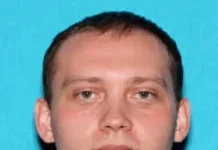Doctor Carlos Chacon, a plastic surgeon from California has been charged with the murder of a woman who died during a boob job after he ‘left’ the room to tend to other patients while she lay dying.
Megan Espinoza, 36, went into cardiac arrest during a breast augmentation surgery at the Divino Surgery Center in Bonita, San Diego, in December 2018.

The surgeon was previously charged with involuntary manslaughter but murder charges were filed against him after prosecutors said they discovered new evidence her death was the result of his recklessness.
District Attorney Gina Darvas reports that he refused to call 911 for more than three hours and banned his employees from doing so and left the operating suite to tend to four other patients while Espinoza lay dying.
And she accused him of cutting corners to make more money by using an untrained nurse to perform anesthesia on mother-of-two Espinoza.
Chacon appeared in court on Monday and pleaded not guilty to the second degree murder charge.

The arrest affidavit states that Espinoza went into cardiac arrest at around 2.30pm in the middle of the surgery and Chacon failed to call emergency services for help.
Chacon reportedly told his employees to lie to her husband Moises Espinoza about her condition and what was really happening.
Darvas told the court that although Chacon phoned two doctors to ask for advice about what to do, he did not give them all the information about what had happened.
Chacon allegedly stated Espinoza did not lose a pulse and hid the fact her heart stopped.
One doctor then told him 911 during a phone call at 5.03pm but he eventually did at 5.24pm, almost three hours after the patient suffered a cardiac arrest.

But he allegedly lied to the operator to cover up in an effort to create ‘plausible deniability’.
And Darvas revealed the surgeon left Espinoza in the operating suite to tend to four other patients as she lay dying.
‘He can’t be providing life-saving treatment to the victim on the table when he’s in his practice seeing other patients,’ said Darvas. ‘We found that to be extremely egregious.’












